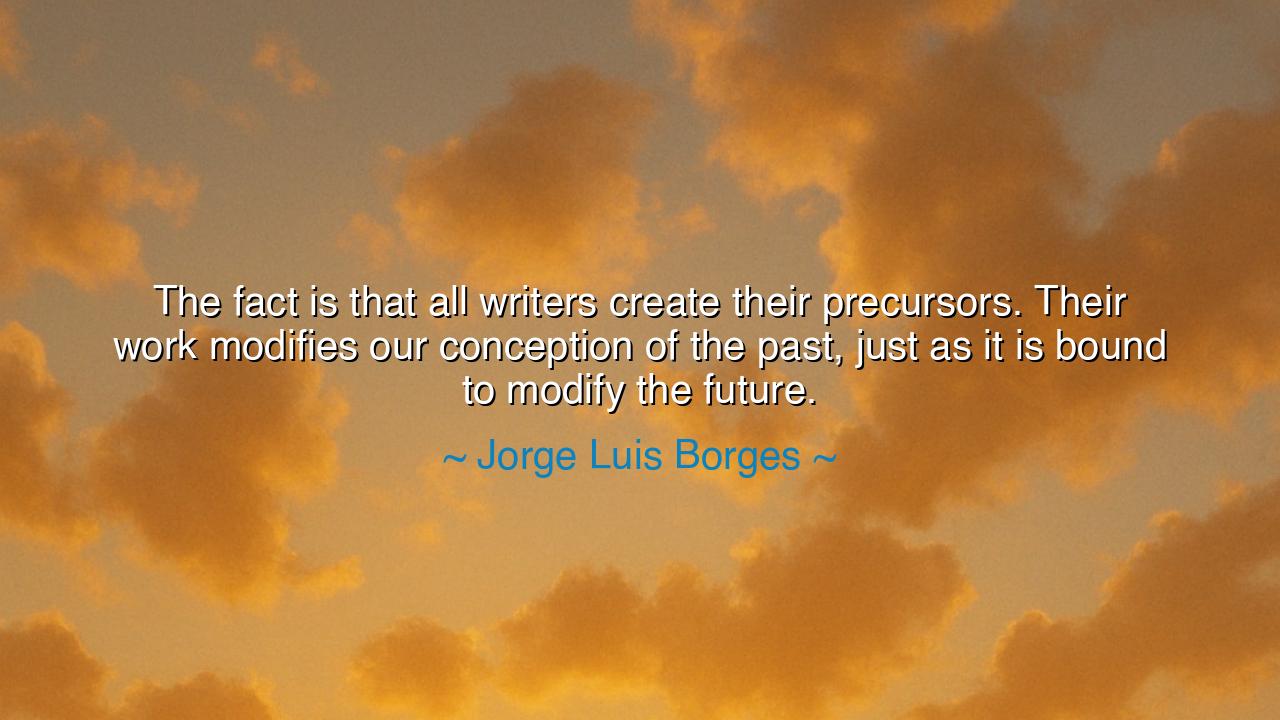
The fact is that all writers create their precursors. Their work
The fact is that all writers create their precursors. Their work modifies our conception of the past, just as it is bound to modify the future.






The words of Jorge Luis Borges—“The fact is that all writers create their precursors. Their work modifies our conception of the past, just as it is bound to modify the future.”—speak with the quiet thunder of eternity. In them lies a revelation that shatters the boundaries of time: that the act of creation does not merely follow history, but reshapes it. When Borges, the blind sage of Buenos Aires, uttered these words, he did not speak only of writers, but of all creators—of thinkers, artists, and dreamers who alter the fabric of meaning itself. For in the world of ideas, the past is not fixed stone, but living clay, forever molded by the hands of the present.
To create, Borges tells us, is to send ripples backward as well as forward. A writer does not stand at the end of a long tradition; rather, through their work, they redefine that tradition. When a new voice rises and sings a new song, it changes how we hear all the songs that came before. The poets of old are reborn through the lens of the new poet’s vision. Thus, the artist does not inherit the past—they recreate it. The path of history, once thought to be a straight line, becomes a circle, or perhaps a labyrinth, where every new word illuminates the old in new light.
Consider how this mystery reveals itself in the story of Franz Kafka, one of Borges’s great inspirations. Before Kafka, the world did not know the peculiar terror of the ordinary—the suffocating dread of bureaucracy, the nightmare hidden in daily life. Yet once Kafka wrote, suddenly men began to see traces of his vision in earlier works: in the Book of Job, in Dante’s circles, in Gogol’s “The Overcoat.” Those ancient voices had always been there, but Kafka’s work awakened them anew. He, as Borges said, created his precursors—for without his vision, we would not have recognized theirs. Such is the power of genius: it rearranges the map of time itself.
This is a truth the ancients dimly perceived but could not fully name. When Plato wrote of eternal forms—of ideas that exist beyond time—he glimpsed the same mystery Borges would later describe. The great works of thought and art exist outside chronology. They converse across centuries, as stars do across the cosmos, each light reaching the others long after its birth. A writer, then, does not simply follow those who came before; they enter into dialogue with eternity, and through their voice, the voices of the dead speak again, changed and renewed.
In this vision, even the reader becomes part of the creation. For each time a mind encounters a text, it reshapes its meaning. What Homer meant to an Athenian warrior differs from what he means to a modern soul. Yet both are true, for each age reads with its own eyes. The act of reading, like the act of writing, changes both the present and the past. Thus, Borges reminds us that no masterpiece ever stands still. It grows and breathes, changing shape as it moves through time, like a living flame passed from one torchbearer to another.
The lesson is profound: do not see yourself as merely a receiver of history, but as its co-creator. When you create, you participate in the rewriting of time. Your words, your art, your thought—these are not echoes of what came before, but forces that reshape how the past is remembered and how the future will unfold. The power of creation is not only to build, but to reinterpret—to look at what has been and see it anew. In doing so, you stand alongside Borges and all who came before him, shaping the infinite library of human thought.
Therefore, take heart in this truth, O seeker of wisdom: nothing in the past is truly complete. Every act of imagination breathes new life into what was. When you write, paint, sing, or think deeply, you call forth the ghosts of history and clothe them in new garments of meaning. Let this embolden you, for you are not bound by tradition—you are its continuation, its renewal, its fire. And so, as Borges foretold, each creator becomes both ancestor and descendant, standing at once at the dawn and the twilight of time.
In the end, to create is to reorder the cosmos. The artist, the thinker, the dreamer—all become alchemists of history, turning memory into revelation. The future bends to their vision, and even the past bows in recognition. Thus, the words of Borges are not only a reflection on art—they are a reminder of our divine inheritance: that through creation, we transcend time itself.






AAdministratorAdministrator
Welcome, honored guests. Please leave a comment, we will respond soon